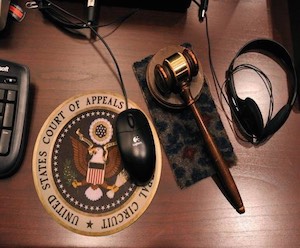“Where a patentee asserts multiple bases for distinguishing the prior art during prosecution, each separate argument can create a separate prosecution estoppel if it shows a clear and unmistakable surrender of subject matter and as long as the prior art was not distinguished based on the combination of these various grounds.”
 The Federal Circuit issued an opinion on July 29 affirming the District Court for the District of Delaware’s dismissal of Amgen Inc. and Amgen Manufacturing Ltd.’s (collectively, “Amgen”) complaint alleging infringement of U.S. Patent 8,273,707 (the “’707 Patent”) for failure to state a claim. The district court held that prosecution history estoppel barred Amgen from succeeding on its infringement claim under the doctrine of equivalents. Amgen Inc. v. Coherus BioSciences, Inc., No. 18-1993 (Fed Cir. July 29, 2019) (Before Reyna, Hughes, and Stoll, Circuit Judges) (Opinion for the Court, Stoll, Circuit Judge).
The Federal Circuit issued an opinion on July 29 affirming the District Court for the District of Delaware’s dismissal of Amgen Inc. and Amgen Manufacturing Ltd.’s (collectively, “Amgen”) complaint alleging infringement of U.S. Patent 8,273,707 (the “’707 Patent”) for failure to state a claim. The district court held that prosecution history estoppel barred Amgen from succeeding on its infringement claim under the doctrine of equivalents. Amgen Inc. v. Coherus BioSciences, Inc., No. 18-1993 (Fed Cir. July 29, 2019) (Before Reyna, Hughes, and Stoll, Circuit Judges) (Opinion for the Court, Stoll, Circuit Judge).
The ’707 Patent is directed to methods of purifying proteins using hydrophobic interaction chromatography (“HIC”). Purification from contaminants allows proteins to be therapeutically useful. Claim 1 recites:
- A process for purifying a protein on a hydrophobic interaction chromatography column such that the dynamic capacity of the column is increased for the protein comprising
mixing a preparation containing the protein with a combination of a first salt and a second salt,
loading the mixture onto a hydrophobic interaction chromatography column, and eluting the protein,
wherein the first and second salts are selected from the group consisting of citrate and sulfate, citrate and acetate, and sulfate and acetate, respectively, and
wherein the concentration of each of the first salt and the second salt in the mixture is between about 0.1 M and about 1.0.
Prosecution History
During prosecution, the examiner repeatedly rejected the claims as obvious in view of U.S. Patent 5,231,178 (“Holz”). In response, Amgen distinguished the ‘707 Patent based on the particular combination of salts claimed. Amgen argued that Holz did not teach or suggest any combinations of salts or the particular combinations of salts claimed in the ‘707 Patent. Amgen presented additional arguments, including that Holz did not teach dynamic capacity at all while the claimed invention was directed to increasing the dynamic capacity of a HIC column. In her declaration, the inventor explained and highlighted that the particular salt combinations claimed in the ‘707 Patent resulted in significant improvements over prior art, including increases in the dynamic capacity.
After Coherus filed an abbreviated Biologic License Application (aBLA) seeking approval to market a biosimilar version of an Amgen product, and the aBLA revealed that Coherus’s manufacturing process contained steps used to purify a protein using a salt combination, although not the one recited in Amgen’s claims, Amgen sued for patent infringement. The district court granted Coherus’ motion to dismiss, holding, first, that Amgen clearly and unmistakably surrendered salt combinations other than the particular combinations recited in the ‘707 Patent during prosecution, and, second, that Amgen had dedicated the particular combination used by Coherus to the public by disclosing but not claiming it. The court thus dismissed Amgen’s complaint for failure to state a claim. The Federal Circuit affirmed.
Clear and Unmistakable
“Prosecution history estoppel applies as part of an infringement analysis to prevent a patentee from using the doctrine of equivalents to recapture subject matter surrendered from the literal scope of a claim during prosecution[].” Argument-based estoppel, at issue in this appeal, can occur “by surrendering claim scope through argument to the patent examiner” and exists where prosecution history shows “a clear and unmistakable surrender of subject matter.” Here, Amgen clearly and unmistakably surrendered unclaimed salt combinations during prosecution, said the court. In its initial response, Amgen distinguished the prior art on the basis that the prior art did not teach or suggest the “particular combinations of salts” recited in the ‘707 Patent. Furthermore, both in its response and accompanying Declaration, Amgen repeatedly discussed the particular combination of salts claimed without mentioning any others. Amgen’s response concluded by specifically emphasizing that “[u]se of this particular combination of salts greatly improves the cost-effectiveness of commercial manufacturing.” A competitor would reasonably believe that Amgen surrendered unclaimed salt combinations.
The fact that Amgen asserted three separate bases for distinguishing the prior art during prosecution, only one of which was relevant here, did not obviate the Court’s conclusion. “[W]here a patent applicant sets forth multiple bases to distinguish between its invention and the cited prior art, the separate arguments [can] create separate estoppels as long as the prior art was not distinguished based on the combination of these various grounds.” Here, Amgen did not rely on a combination of the asserted grounds to distinguish the prior art.
Similarly, the fact that Amgen’s response to the examiner, which resulted in the allowance of the claims, did not contain the “particular combinations” argument was inapposite. No requirement exists that argument-based estoppel apply only to arguments made in the submission immediately preceding allowance. In fact, “[c]lear assertions made during prosecution in support of patentability, whether or not actually required to secure allowance of the claim, may also create an estoppel.” Here, Amgen repeatedly emphasized the particular combination of salts claimed and could not now recapture the surrendered subject matter, said the opinion. Because prosecution estoppel barred Amgen from succeeding on its infringement claim under the doctrine of equivalents, its complaint was dismissed.

![[IPWatchdog Logo]](https://ipwatchdog.com/wp-content/themes/IPWatchdog%20-%202023/assets/images/temp/logo-small@2x.png)





![[Advertisement]](https://ipwatchdog.com/wp-content/uploads/2024/04/UnitedLex-May-2-2024-sidebar-700x500-1.jpg)
![[Advertisement]](https://ipwatchdog.com/wp-content/uploads/2024/04/Artificial-Intelligence-2024-REPLAY-sidebar-700x500-corrected.jpg)
![[Advertisement]](https://ipwatchdog.com/wp-content/uploads/2024/04/Patent-Litigation-Masters-2024-sidebar-700x500-1.jpg)

![[Advertisement]](https://ipwatchdog.com/wp-content/uploads/2021/12/WEBINAR-336-x-280-px.png)
![[Advertisement]](https://ipwatchdog.com/wp-content/uploads/2021/12/2021-Patent-Practice-on-Demand-recorded-Feb-2021-336-x-280.jpg)
![[Advertisement]](https://ipwatchdog.com/wp-content/uploads/2021/12/Ad-4-The-Invent-Patent-System™.png)






Join the Discussion
One comment so far.
TFCFM
August 22, 2019 10:20 amThis is, of course, why one of the first steps in training a new patent agent/associate for prosecution is to give them a Miranda-like warning:
“Anything you say may be used against you…”
(THEN, you can “book” them, preferably with the MPEP.)